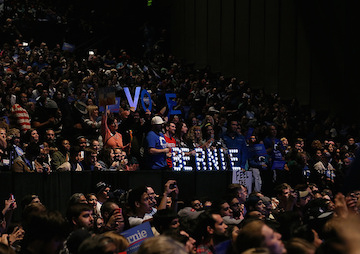Ordinary Voters Can Now Lobby Superdelegates for Bernie Sanders
A recently created “superdelegate list” urges voters to “hold party officials accountable.” But would that help or hurt the Sanders campaign for the Democratic nomination? Supporters at a Bernie Sanders rally in Texas. (via Flickr)
Supporters at a Bernie Sanders rally in Texas. (via Flickr)
Supporters at a Bernie Sanders rally in Texas. (via Flickr)
It’s no secret that Democratic presidential candidate Bernie Sanders is behind rival Hillary Clinton in superdelegates. The conversation is inevitably turning to the math of their contest — and the acknowledgement that, although the superdelegates haven’t officially voted yet, they are on Clinton’s side.
Recently, though, Sanders has started to argue that superdelegates in the states he’s won should support him for the party’s nomination. Even if that happened, though, Sanders would still be behind Clinton, leading many to wonder why his campaign is focused on winning over superdelegates. Vox analyzed the situation:
There are a few different plausible explanations for what might be going on here, according to Matt Grossmann, a political scientist at the University of Michigan.
One is that Sanders genuinely thinks he’s the best hope for the Democratic Party, and that he believes that the superdelegates really can be persuaded to rescue his candidacy. …
The superdelegates are not elected to their roles for the Democratic National Convention, but they do frequently hold elective office — as mayors, governors and other key positions.
Some of these officials’ constituents are vocal, passionate Sanders supporters who are not happy to see their local representatives support Clinton.
These “vocal” and “passionate” supporters may want to look into the “superdelegate list,” created with the intention of helping voters get in touch with their state’s superdelegates. Spencer Thayer, the list’s creator, explained his intentions on the website:
The superdelegate system is rigged to protect establishment politicians and shut down populism. Superdelegates by their very nature diminish the value of the vote by giving an elite constituency of representatives, party leaders, and even lobbyists extra power. The Superdelegate List exists to help voters challenge this undemocratic system. Contacting our elected representatives and party leaders and holding them to account is an American tradition. This is the only way to keep the voter base from being patronized or ignored.
A Chicago activist, Thayer makes it clear that he has no connection with the Sanders campaign — in fact, he notes, “The Sanders camp has publicly rejected the notion that individual supporters should be reaching out to superdelegates on their own.” The Washington Post reports that some superdelegates are accusing Sanders’ supporters of “bullying”:
Longtime Democratic National Committee member and superdelegate Bob Mulholland … said he has not received any threats directly but has fielded complaints from other delegates who said they have received harassing emails, Facebook postings and phone calls — including one to a woman at 10:30 p.m. and another that a 12-year-old child picked up. …
“Society has been trying to deal with High School bullies and the same Rule should apply to your campaign and your supporters,” wrote Mulholland, who supports Clinton. “Professionally, campaign staff and representatives should be the ones calling delegates.
Thayer, however, stresses that the list is composed entirely of public contact information, and he notes that he’s received rewarding public support since creating the site.
As political scientist Matt Grossmann explained to Vox, Sanders could potentially reap benefits by lowering Clinton’s superdelegate support:
“The more they get that number down, that could potentially help him at the convention change the rule or change the planks. The closer he is, the better off he is — that’s the line of argument he’s making for superdelegates. It’s not so he has those people; it’s just so the outcome appears closer than it does now.”
Sanders currently has the pledged support of 39 out of 712 superdelegates. Targeted lobbying by his supporters could increase those numbers – or it may irritate superdelegates who don’t believe it’s the place of ordinary voters to lobby them.
Either way, Thayer is proud of the list. “Historically, the superdelegates have been able to disenfranchise voters without being held accountable,” he says. “[T]hose in power have a tendency to interpret challenges to their authority as harassment. I’m not sympathetic to that point of view.”
–Posted by Emma Niles
Your support matters…Independent journalism is under threat and overshadowed by heavily funded mainstream media.
You can help level the playing field. Become a member.
Your tax-deductible contribution keeps us digging beneath the headlines to give you thought-provoking, investigative reporting and analysis that unearths what's really happening- without compromise.
Give today to support our courageous, independent journalists.






You need to be a supporter to comment.
There are currently no responses to this article.
Be the first to respond.